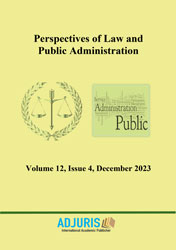Criminological Theories
Criminological Theories
Author(s): Robert-Marian TrandafirSubject(s): Criminal Law, Sociology, Criminology, Sociology of Law
Published by: Societatea de Stiinte Juridice si Administrative
Keywords: criminology; crime; delinquency; legal sociology;
Summary/Abstract: Criminology is an interdisciplinary discipline that deals with the study of crime, delinquency and antisocial behavior. This involves analyzing and understanding the causes, consequences and prevention of criminal activities. Criminology combines aspects of psychology, sociology, law and statistics to provide a holistic perspective on the criminal phenomenon. The evolution of criminology has been influenced over time by various theories and perspectives on crime. From classical approaches such as rational choice theory and anomie theory to contemporary approaches such as labeling theory and social control theory, criminology has continuously developed to bring new understandings and solutions to crime. The study of crime and criminology is of significant importance in society. They help identify risk factors and develop prevention and intervention strategies in the case of criminal activities. Through research and analysis, patterns and trends in criminal behavior can be identified, which can help improve criminal justice systems and develop effective crime-fighting policies. Research methods used in criminology vary and include quantitative and qualitative techniques. These may involve analysis of statistical data, interviews with offenders or victims, direct observations or analysis of relevant documents. By using such methods, criminologists can obtain essential information for understanding the criminal phenomenon and developing appropriate strategies. The criminologist has an important role in society. He is responsible for analyzing and interpreting crime and delinquency data, developing and evaluating crime prevention policies and programs, and contributing to developments in the field of criminology. The criminologist can also provide expertise in criminal investigation and criminal justice systems, having a direct impact on how society responds to the criminal phenomenon. In conclusion, criminology is a complex and interdisciplinary discipline that studies the phenomenon of crime and criminality. Through research, analysis and the application of knowledge in the field, criminology contributes to the understanding, prevention and management of crime, playing a crucial role in building a safer and more just society.
Journal: Perspectives of Law and Public Administration
- Issue Year: 12/2023
- Issue No: 4
- Page Range: 590-596
- Page Count: 7
- Language: English

